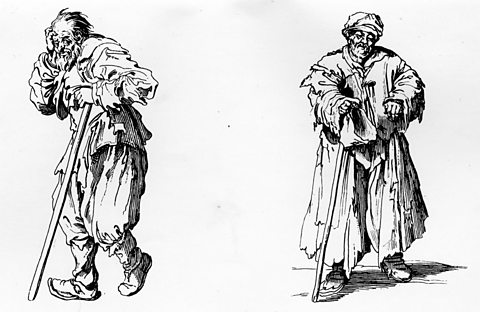The growth of economic pressures in the Tudor period
Economic changes
During the 16th century, there was a sharp increase in the number of vagrant91»»Ī¨less, unemployed person who wandered the streets. .

Vagrancy came to be seen as a serious crime in Tudor times. At the time, many people believed vagrancy was caused by idleness. People saw the vagrants, or 'vagabonds', as weak, lazy people.
Some people blamed the vagrants themselves for encouraging drunkenness. Others believed vagrants had been born with a flaw that led them into idleness and crime.
Many people felt threatened by their presence, believing they were spreading the plague or likely to rise up in rebellion, as some were ex-soldiers. In response the Elizabethan Poor Laws of 1598 and 1601 made each parish responsible for looking after its poor, and punished vagabonds.
However, there were several economic pressures in this century that explain the rise of poverty and the crime of vagrancy.
The population of England and Wales was increasing during the 16th century. This led to more people competing for jobs and land.
England was becoming a wealthier country, through increased trade and commerce. Some merchants and landowners were getting richer. However, most people were still very poor.
Unemployment
Many people worked in the cloth industry. When the cloth trade went into a slump, weavers and spinners lost their jobs and incomes.
Unemployment was not just a problem in the cloth industry. Henry VII disbanded the private armies that had existed during the Wars of the Roses Wars during the 15th century between the houses of York and Lancaster. The wars were a fight for the throne of England. The wars ended when Henry VII became king in 1485.. This led to many men losing their jobs. Many nobles lost their wealth during these wars, and so they began to employ fewer people on their land and estates.
Tenant farmers
Many people in Tudor times were tenant farmers who rented or leased land from wealthy nobles or merchants. When richer farmers and merchants began to enclose land for sheep farming, the cost of renting land rose rapidly. This was known as rack-renting. This deprived many tenants of their rented land.
Tenant farmers were reliant on the harvest for their survival. There were many bad harvests in the 16th century, especially in 1556, 1596 and 1597. These factors led to rural depopulation ‚Äď workers leaving the countryside looking for jobs in the towns.
Inflation
Poverty was made worse by inflation. The prices of essential goods including food rose as the population grew, forcing some people to leave their homes in search of help and food.
The increase in taxation to pay for foreign wars against France, Scotland and Spain also made people poorer and inflation worse.
Dissolution of the monasteries
The dissolution of the monasteriesBetween 1536 and 1541, Henry VIII closed all of the monasteries in England and Wales. All of their land and buildings were sold. under Henry VIII increased the number of unemployed, eg monks, servants and labourers, and simultaneously removed the help for the poor and sick that monasteries provided.
